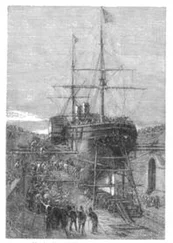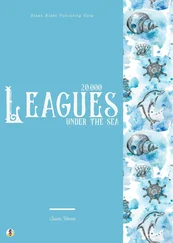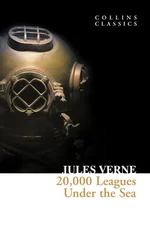Jules Verne - Twenty Thousand Leagues Under the Sea
Здесь есть возможность читать онлайн «Jules Verne - Twenty Thousand Leagues Under the Sea» — ознакомительный отрывок электронной книги совершенно бесплатно, а после прочтения отрывка купить полную версию. В некоторых случаях можно слушать аудио, скачать через торрент в формате fb2 и присутствует краткое содержание. Жанр: sf_writing, на английском языке. Описание произведения, (предисловие) а так же отзывы посетителей доступны на портале библиотеки ЛибКат.
- Название:Twenty Thousand Leagues Under the Sea
- Автор:
- Жанр:
- Год:неизвестен
- ISBN:нет данных
- Рейтинг книги:5 / 5. Голосов: 2
-
Избранное:Добавить в избранное
- Отзывы:
-
Ваша оценка:
- 100
- 1
- 2
- 3
- 4
- 5
Twenty Thousand Leagues Under the Sea: краткое содержание, описание и аннотация
Предлагаем к чтению аннотацию, описание, краткое содержание или предисловие (зависит от того, что написал сам автор книги «Twenty Thousand Leagues Under the Sea»). Если вы не нашли необходимую информацию о книге — напишите в комментариях, мы постараемся отыскать её.
Twenty Thousand Leagues Under the Sea — читать онлайн ознакомительный отрывок
Ниже представлен текст книги, разбитый по страницам. Система сохранения места последней прочитанной страницы, позволяет с удобством читать онлайн бесплатно книгу «Twenty Thousand Leagues Under the Sea», без необходимости каждый раз заново искать на чём Вы остановились. Поставьте закладку, и сможете в любой момент перейти на страницу, на которой закончили чтение.
Интервал:
Закладка:
I looked at the last rays crowning the peak, and the shadows mounting by degrees up its slopes. At that moment Captain Nemo, resting with his hand on my shoulder, said:
"I, Captain Nemo, on this 21st day of March, 1868, have reached the South Pole on the ninetieth degree; and I take possession of this part of the globe, equal to one-sixth of the known continents."
"In whose name, captain?"
"In my own, sir!"
Saying which, Captain Nemo unfurled a black banner, bearing an N in gold quartered on its bunting. Then turning toward the orb of day, whose last rays lapped the horizon of the sea, he exclaimed:
"Adieu, sun! Disappear, thou radiant orb! Rest beneath this open sea, and let a night of six months spread its shadows over my new domains!"
| Go to Contents |
The next day, the 22d of March, at six in the morning, preparations for departure were begun. The last gleams of twilight were melting into night. The cold was great; the constellations shone with wonderful intensity. In the zenith glittered that wondrous Southern Cross-the polar bear of antarctic regions. The thermometer showed twelve degrees below zero, and when the wind freshened, it was most biting. Flakes of ice increased on the open water. The sea seemed everywhere alike. Numerous blackish patches spread on the surface, showing the formation of fresh ice. Evidently the southern basin, frozen during the six winter months, was absolutely inaccessible. What became of the whales in that time? Doubtless they went beneath the icebergs, seeking more practicable seas. As to the seals and morses, accustomed to live in a hard climate, they remained on these icy shores. These creatures have the instinct to break holes in the ice-fields, and to keep them open. To these holes they come for breath; when the birds, driven away by the cold, have emigrated to the north, these sea mammals remain sole masters of the polar continent. But the reservoirs were filling with water, and the Nautilus was slowly descending. At 1,000 feet deep it stopped; its screw beat the waves, and it advanced straight toward the north, at a speed of fifteen miles an hour. Toward night it was already floating under the immense body of an iceberg. At three in the morning I was awakened by a violent shock. I sat up in my bed and listened in the darkness, when I was thrown into the middle of the room. The Nautilus, after having struck, had rebounded violently. I groped along the partition, and by the staircase to the saloon, which was lit by the luminous ceiling. The furniture was upset. Fortunately the windows were firmly set, and had held fast. The pictures on the starboard side, from being no longer vertical, were clinging to the paper, while those of the port side were hanging at least a foot from the wall. The Nautilus was lying on its starboard side perfectly motionless. I heard footsteps, and a confusion of voices; but Captain Nemo did not appear. As I was leaving the saloon, Ned Land and Conseil entered.
"What is the matter?" said I, at once.
"I came to ask you, sir," said Conseil.
"Confound it!" exclaimed the Canadian, "I know well enough! The Nautilus has struck; and judging by the way she lies, I do not think she will right herself as she did the first time in Torres Straits."
"But," I asked, "has she at least come to the surface of the sea?"
"We do not know," said Conseil.
"It is easy to decide," I answered. I consulted the manometer. To my great surprise it showed a depth of more than 180 fathoms. "What does that mean?" I exclaimed.
"We must ask Captain Nemo," said Conseil.
"But where shall we find him?" said Ned Land.
"Follow me," said I to my companions.
We left the saloon. There was no one in the library. At the center staircase, by the berths of the ship's crew, there was no one. I thought that Captain Nemo must be in the pilot's cage. It was best to wait. We all returned to the saloon. For twenty minutes we remained thus, trying to hear the slightest noise which might be made on board the Nautilus, when Captain Nemo entered. He seemed not to see us; his face, generally so impassive, showed signs of uneasiness. He watched the compass silently, then the manometer; and going to the planisphere, placed his finger on the spot representing the southern seas. I would not interrupt him; but, some minutes later, when he turned toward me, I said, using one of his own expressions in the Torres Straits:
"An incident, captain?"
"No, sir; an accident this time."
"Serious?"
"Perhaps."
"Is the danger immediate?"
"No."
"The Nautilus has stranded?"
"Yes."
"And this has happened-how?"
"From a caprice of nature, not from the ignorance of man. Not a mistake has been made in the working. But we cannot prevent equilibrium from producing its effects. We may brave human laws, but we cannot resist natural ones."
Captain Nemo had chosen a strange moment for uttering this philosophical reflection. On the whole, his answer helped me little.
"May I ask, sir, the cause of this accident?"
"An enormous block of ice, a whole mountain, has turned over," he replied. "When icebergs are undermined at their base by warmer water or reiterated shocks, their center of gravity rises, and the whole thing turns over. This is what has happened; one of these blocks, as it fell, struck the Nautilus, then, gliding under its hull, raised it with irresistible force, bringing it into beds which are not so thick, where it is lying on its side."
"But can we not get the Nautilus off by emptying its reservoirs, that it may regain its equilibrium?"
"That, sir, is being done at this moment. You can hear the pump working. Look at the needle of the manometer; it shows that the Nautilus is rising, but the block of ice is rising with it; and, until some obstacle stops its ascending motion, our position cannot be altered."
Indeed, the Nautilus still held the same position to starboard; doubtless it would right itself when the block stopped. But at this moment who knows if we may not strike the upper part of the iceberg, and if we may not be frightfully crushed between the two glassy surfaces? I reflected on all the consequences of our position. Captain Nemo never took his eyes off the manometer. Since the fall of the iceberg, the Nautilus had risen about a hundred and fifty feet, but it still made the same angle with the perpendicular. Suddenly a slight movement was felt in the hold. Evidently it was righting a little. Things hanging in the saloon were sensibly returning to their normal position. The partitions were nearing the upright. No one spoke. With beating hearts we watched and felt the straightening. The boards became horizontal under our feet. Ten minutes passed.
"At last we have righted!" I exclaimed.
"Yes," said Captain Nemo, going to the door of the saloon.
"But are we floating?" I asked.
"Certainly," he replied; "since the reservoirs are not empty; and, when empty, the Nautilus must rise to the surface of the sea."
We were in open sea; but at a distance of about ten yards, on either side of the Nautilus, rose a dazzling wall of ice. Above and beneath the same wall: above, because the lower surface of the iceberg stretched over us like an immense ceiling: beneath, because the overturned block, having slid by degrees, had found a resting-place on the lateral walls, which kept it in that position. The Nautilus was really imprisoned in a perfect tunnel of ice more than twenty yards in breadth, filled with quiet water. It was easy to get out of it by going either forward or backward, and then make a free passage under the iceberg, some hundreds of yards deeper. The luminous ceiling had been extinguished, but the saloon was still resplendent with intense light. It was the powerful reflection from the glass partition sent violently back to the sheets of the lantern. I cannot describe the effect of the voltaic rays upon the great blocks so capriciously cut; upon every angle, every ridge, every facet, was thrown a different light, according to the nature of the veins running through the ice; a dazzling mine of gems, particularly of sapphires, their blue rays crossing with the green of the emerald. Here and there were opal shades of wonderful softness, running through bright spots like diamonds of fire, the brilliancy of which the eye could not bear. The power of the lantern seemed increased a hundredfold, like a lamp through the lenticular plates of a first-class lighthouse.
Читать дальшеИнтервал:
Закладка:
Похожие книги на «Twenty Thousand Leagues Under the Sea»
Представляем Вашему вниманию похожие книги на «Twenty Thousand Leagues Under the Sea» списком для выбора. Мы отобрали схожую по названию и смыслу литературу в надежде предоставить читателям больше вариантов отыскать новые, интересные, ещё непрочитанные произведения.
Обсуждение, отзывы о книге «Twenty Thousand Leagues Under the Sea» и просто собственные мнения читателей. Оставьте ваши комментарии, напишите, что Вы думаете о произведении, его смысле или главных героях. Укажите что конкретно понравилось, а что нет, и почему Вы так считаете.












